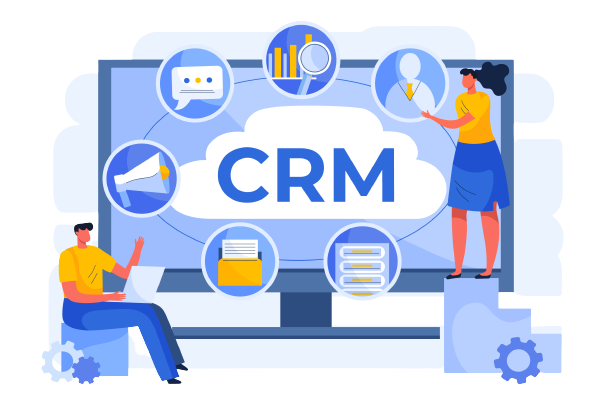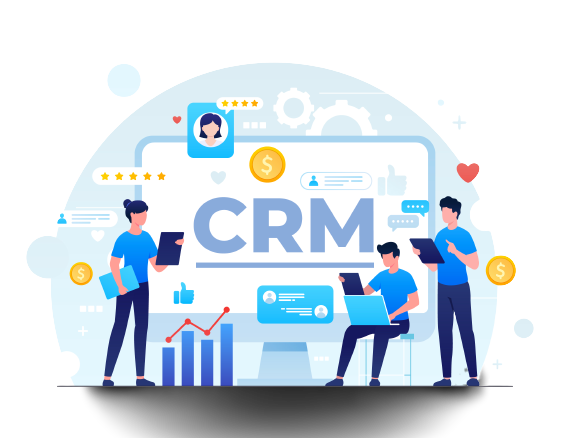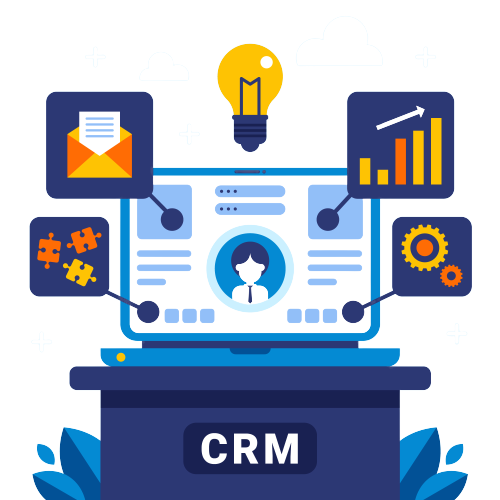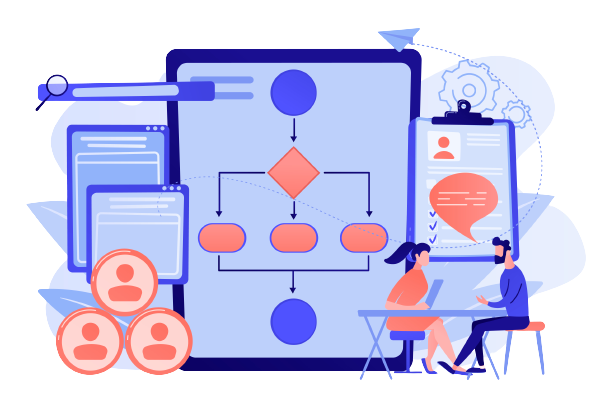
Have you ever wondered how some businesses manage to stay organized, boost customer satisfaction, and skyrocket their growth all at once? Well, the secret lies in CRM – Customer Relationship Management.
You’ve got big dreams for your small business, and you want to provide top-notch customer experiences while juggling multiple tasks. That’s where CRM comes in – it’s like your business’s personal superhero, helping you manage customer interactions, streamline operations, and ultimately, reach those ambitious goals.
And guess what? In 2023, the world of CRM has some exciting offerings that are tailor-made for small businesses just like yours. We’re about to give you a sneak peek of the 7 best CRM apps for small businesses in 2023 that are set to make waves this year. These apps aren’t just tools; they’re your partners in growth, your allies in customer satisfaction, and your guides to operational excellence.
So, get ready – we’re about to embark on a journey through the dynamic world of CRM, exploring how these 7 top-notch apps can take your small business to new heights. Let’s get ready to elevate your operations and turn those big dreams into reality!
Choosing the Right CRM App for Your Small Business: Key Considerations and Factors
Selecting the right CRM apps for small businesses is a critical decision that can have a significant impact on your operations, customer relationships, and overall success. To make an informed choice, it’s essential to consider several key factors that align with your business goals and needs. Let’s delve into the essential factors to consider when selecting a CRM app for your small business:
1. Scalability: Scalability refers to the CRM’s ability to grow alongside your business. As your small business expands, your customer base and data will likely increase. It’s crucial to choose a CRM app that can accommodate this growth without sacrificing performance or functionality. Look for solutions that offer flexible pricing plans and can handle a larger volume of contacts, interactions, and data points.
2. Features and Functionality: Different CRM apps offer varying features and functionalities. Assess your specific requirements and identify the features that align with your business needs. Common CRM features include contact management, lead tracking, sales automation, task management, email marketing, reporting, and analytics. Prioritize features that directly contribute to streamlining your operations and enhancing customer interactions.
3. Pricing and Budget: Pricing is a significant consideration for any small business. CRM apps come with different pricing structures, including subscription-based models, tiered plans, and pay-as-you-go options. Evaluate your budget and consider not only the upfront costs but also any additional fees for integrations, training, and support. Choose the best CRM apps for small businesses that offer a good balance between affordability and the features you require.
4. Integration Capabilities: For optimal efficiency, your CRM app should seamlessly integrate with other tools and software your business uses. Consider your existing tech stack, including email marketing platforms, e-commerce systems, accounting software, and more. Look for a CRM app that offers a wide range of integrations or has an open API, allowing you to connect and automate various processes across your business ecosystem.
5. User-Friendly Interface: Usability is critical, especially for small businesses with limited resources. A user-friendly and the best CRM apps for small businesses ensure that your team can quickly adapt to the system, minimizing the learning curve. Test the user interface and navigation before making a decision to ensure that it’s intuitive and easy to use for both tech-savvy and non-technical team members.
6. Customization and Flexibility: Every small business has unique processes and workflows. A CRM app should be customizable to match your specific requirements. Look for options to create custom fields, workflows, and reports tailored to your business needs. A flexible CRM solution empowers you to adapt the software to your evolving processes rather than the other way around.
7. Mobile Compatibility: In today’s fast-paced business environment, the ability to access your CRM data on the go is crucial. Choose the best CRM apps for small businesses that offer mobile compatibility through dedicated mobile apps or responsive web interfaces. This ensures that your team can stay connected and productive even when away from the office.
8. Excellent Training & Customer Support: Reliable customer support and comprehensive training resources are essential, especially during the implementation phase. Check the CRM provider’s support channels, response times, and availability. Look for options that provide tutorials, documentation, webinars, and user communities to help your team make the most of the CRM app.
By evaluating these factors in alignment with your business goals, you can make a well-informed decision that empowers your small business to effectively manage customer relationships, streamline operations, and drive growth.
Exploring the Top Features of Leading CRM Apps: What to Look for in 2023

Let’s dive into the standout features offered by the 7 best CRM apps for small businesses, highlighting their capabilities in contact management, sales automation, reporting, and customer segmentation. These features play a pivotal role in enhancing a small business’s operations, customer interactions, and overall growth.
- Contact Management: Effective contact management lies at the heart of any CRM app. These top-tier and the best CRM apps for small businesses offer comprehensive tools to help small businesses organize, store, and access customer information seamlessly. Users can create detailed profiles for each contact, including their personal details, communication history, purchase behavior, and more. This feature streamlines interactions by providing a 360-degree view of every customer, ensuring that every engagement is personalized and relevant.
- Sales Automation: Sales automation empowers small businesses to streamline and optimize their sales processes, making them more efficient and effective. The best CRM apps for small businesses offer automated workflows that guide sales teams through various stages of the sales cycle. This includes lead scoring, opportunity tracking, and task automation. With sales automation, businesses can prioritize leads, trigger follow-up actions, and ensure that no potential opportunity falls through the cracks.
- Reporting and Analytics: In the digital age, data-driven decision-making is crucial. The top CRM apps provide advanced reporting and analytics tools that allow small businesses to track and measure key performance indicators (KPIs). These KPIs may include sales metrics, lead conversion rates, customer acquisition costs, and more. Customizable dashboards and reports provide valuable insights, enabling businesses to assess their performance, identify trends, and make informed strategic choices.
- Customer Segmentation: Tailoring marketing efforts to specific customer segments can significantly improve engagement and conversion rates. The best CRM apps for small businesses excel in customer segmentation, enabling businesses to categorize their customer base based on various criteria such as demographics, purchase history, behavior, and preferences. By segmenting customers, businesses can create targeted marketing campaigns that resonate with each group, resulting in higher levels of engagement and improved ROI.
- Personalization and Communication: Effective communication is key to building strong customer relationships. CRM apps offer personalized communication tools that allow businesses to send automated yet personalized messages to customers at various touchpoints in their journey. These can include welcome emails, follow-up messages, birthday greetings, and more. Personalization enhances customer engagement, fosters loyalty, and drives repeat business.
- Omnichannel Communication: The concept of omnichannel communication has become crucial for modern businesses. These best CRM apps for small businesses excel in providing a seamless experience across various communication channels, including email, phone, chat, and social media. This feature ensures that interactions with customers are consistent and cohesive, regardless of the channel they choose. For instance, a customer’s inquiry on social media can seamlessly transition to a live chat conversation without any disruption. This fosters a holistic customer experience, enhancing engagement and satisfaction.
- Workflows & Pipeline Management: Workflows and pipeline management are essential components of the best CRM apps for small businesses. These tools allow businesses to define and automate specific processes and stages in their sales cycle. Users can create customized workflows that guide them through tasks, ensuring that leads are nurtured systematically and no step is overlooked. Pipeline management provides a visual representation of deals at different stages, helping sales teams prioritize and focus on closing opportunities. These features enhance efficiency, reduce manual effort, and optimize the sales process.
- Social Media Management: Social media has become a cornerstone of modern marketing strategies. The best CRM apps understand this and offer social media management capabilities. Businesses can schedule and publish posts across various social platforms, monitor brand mentions, engage with customers, and analyze social media performance. Integration with social media management tools provides a comprehensive view of a business’s online presence, allowing for better engagement and brand management.
- Booking & Appointment Scheduling: Many businesses, especially service-based ones, rely on appointments and bookings. These best CRM apps for small businesses often include built-in booking and appointment scheduling functionalities. Customers can conveniently schedule appointments online, and the CRM automatically updates calendars, sends confirmations, and even triggers follow-up communications. This feature simplifies the booking process, reduces scheduling conflicts, and enhances customer convenience.
- Billing & Invoicing Automation: Handling financial transactions efficiently is crucial for small businesses. The best CRM apps for small businesses often offer billing and invoicing automation, allowing businesses to generate and send invoices directly from the CRM. This feature can be integrated with accounting software, ensuring seamless financial management. Automation reduces manual data entry, minimizes errors, and accelerates the payment process, improving cash flow and reducing administrative burdens.
These advanced features contribute significantly to the capabilities of the best CRM apps for small businesses. They cater to the diverse needs of modern businesses, from enhancing customer communication and engagement to optimizing internal workflows and automating essential tasks. By providing an integrated solution that encompasses these features, these CRM apps empower small businesses to operate efficiently, deliver exceptional customer experiences, and drive sustainable growth.
7 Best CRM Apps for Small Businesses in 2023

In 2023, small businesses will have a wide array of CRM (Customer Relationship Management) apps at their disposal, each designed to streamline operations, enhance customer interactions, and ultimately contribute to business growth. In this dynamic landscape, here are the 7 best CRM apps that are making a significant impact on small businesses:
- EQUP: EQUP is an all-in-one CRM system and a comprehensive software solution that integrates various tools and functionalities to manage and optimize interactions with customers throughout their lifecycle. Unlike traditional CRMs that might focus solely on contact management or sales tracking, EQUP offers a holistic approach by combining multiple features into a single platform. This unified system helps businesses streamline their processes, enhance customer relationships, and drive growth.
- HubSpot CRM: HubSpot’s CRM app is renowned for its user-friendly interface and robust features that cater to small businesses. It offers contact management, email tracking, task automation, and a visual sales pipeline. The seamless integration with HubSpot’s marketing tools enables businesses to nurture leads and convert them into loyal customers seamlessly.
- Zoho CRM: Zoho CRM is known for its affordability and flexibility, making it an ideal choice for small businesses. With lead management, email marketing, and social media integration, Zoho CRM helps businesses engage with customers across various channels. Its AI-driven insights provide valuable data to guide strategic decisions.
- Pipedrive: Pipedrive is designed with sales teams in mind, focusing on visualizing the sales process and driving conversions. The app’s user-friendly interface, customizable pipelines, and activity tracking tools make it a top choice for small businesses looking to streamline their sales operations and close deals more efficiently.
- Freshsales: Freshsales offers a feature-rich CRM platform that is both powerful and intuitive. Its AI-driven lead scoring, email tracking, and event tracking features help businesses identify high-potential leads and personalize interactions. The CRM’s integration capabilities ensure seamless collaboration across teams.
- Insightly: Insightly is a CRM that caters to small businesses seeking end-to-end customer management. It combines traditional CRM features with project management tools, making it an excellent choice for businesses with intricate customer relationships and ongoing projects.
- Bitrix24: Bitrix24 is a comprehensive CRM platform that provides tools for sales, marketing, communication, and project management. Its social intranet features foster collaboration among team members, while automation and reporting tools enhance efficiency and decision-making.
When selecting the best CRM app for your small business in 2023, consider factors such as the size of your business, specific industry needs, scalability, ease of use, and integration capabilities. These top CRM apps offer a range of features to help small businesses build and nurture customer relationships while optimizing operational processes for sustained growth.
Maximizing Customer Relationships: How CRM Apps Boost Engagement and Retention Top of Form

Undoubtedly, CRM apps have become essential tools for small businesses looking to build and nurture meaningful relationships with their customers. These apps go beyond mere data storage – they empower businesses to create personalized experiences, execute targeted marketing campaigns, and establish effective follow-up strategies that drive customer engagement and retention.
Let’s find out how these best CRM apps for small businesses play a pivotal role in nurturing customer relationships:
- Personalized Communication: CRM apps allow small businesses to gather and organize a wealth of customer data, ranging from purchase history and preferences to communication interactions. With this data at their fingertips, businesses can tailor their communication to each individual customer. This personalization extends beyond addressing customers by name; it involves understanding their needs, interests, and pain points. By sending personalized emails, messages, or offers based on customer behavior, businesses can make customers feel valued and understood, fostering a stronger emotional connection.
- Segmentation for Targeted Marketing: Effective marketing requires reaching the right audience with the right message at the right time. The best CRM apps for small businesses excel in segmenting customers based on demographics, behavior, purchase history, and more. Businesses can create highly targeted marketing campaigns that resonate with specific customer groups. For instance, a clothing retailer can send promotions for winter wear to customers in colder regions while promoting beachwear to those in warmer areas. Such precise targeting enhances the relevance of marketing messages, increasing the likelihood of customer response and conversion.
- Automated Follow-ups: Following up with customers after a purchase or interaction is crucial for building lasting relationships. The best CRM apps for small businesses enable businesses to automate follow-up processes, ensuring that no customer falls through the cracks. For instance, an e-commerce store can set up automated “thank you” emails after a purchase or send reminders for upcoming appointments. Automated follow-ups demonstrate commitment to customer satisfaction and help businesses stay engaged with customers over time.
- 360-Degree Customer View: CRM apps provide a unified view of each customer’s interactions with the business across various touchpoints. This 360-degree view enables businesses to anticipate customer needs and preferences. For instance, a customer who recently inquired about a product can be targeted with additional information or offers related to that product. This proactive approach showcases a business’s attentiveness and enhances the customer experience.
- Tracking and Analytics: The best CRM apps for small businesses offer robust tracking and analytics capabilities, enabling businesses to measure the effectiveness of their communication and marketing efforts. By monitoring open rates, click-through rates, and conversion rates, businesses can refine their strategies over time. This data-driven approach ensures continuous improvement and allows businesses to make informed decisions about their customer engagement initiatives.
By leveraging these capabilities of CRM apps, small businesses can create memorable experiences that lead to customer loyalty, repeat business, and advocacy.
Streamlining Small Business Operations with CRM Apps

Efficiency and agility are paramount for small businesses aiming to thrive and grow. This is where the strategic integration of CRM apps becomes a game-changer. By harnessing the power of CRM apps, small businesses can streamline their operations, eliminate bottlenecks, and elevate their overall productivity. Below we have discussed how the best CRM apps for small businesses serve as a pivotal tool in optimizing processes, enhancing collaboration, and paving the way for seamless day-to-day management.
1. Centralizing Data: The Foundation of Efficient Management
One of the primary advantages of utilizing CRM apps is their ability to centralize all customer-related data and interactions into a single, accessible platform. In a small business, data often resides in various silos, making it challenging to gain a comprehensive view of customers, their preferences, and their interactions with the business. The best CRM apps for small businesses consolidate this information, allowing businesses to create a 360-degree customer profile. This centralized repository of data enables teams to make informed decisions, tailor their communication, and gain insights into customer behavior.
2. Automating Tasks: Boosting Productivity and Reducing Manual Workloads
Manual, repetitive tasks can consume a significant portion of a small business’s time and resources. CRM apps automate a wide range of tasks, from data entry and lead assignment to follow-up emails and appointment scheduling. Automation not only reduces the risk of human error but also frees up employees to focus on more strategic and value-added activities. For instance, the best CRM apps for small businesses can automatically assign incoming leads to the appropriate sales representatives, trigger follow-up emails based on customer interactions, and even schedule reminders for important tasks.
3. Optimizing Workflows: Streamlining Processes for Efficiency
Small businesses often have limited resources and personnel, making the optimization of workflows crucial. CRM apps allow businesses to define and customize workflows tailored to their specific processes. For example, a CRM workflow could automate the process of converting a lead to a customer by guiding sales representatives through a series of predefined steps, ensuring consistency and reducing the chances of missed opportunities. By optimizing workflows, the best CRM apps for small businesses help streamline processes, eliminate bottlenecks, and improve overall efficiency.
4. Smoother Day-to-Day Management: The Ripple Effect
The cumulative effect of centralizing data, automating tasks, and optimizing workflows has a significant impact on day-to-day management. Decision-makers have real-time access to accurate data, enabling them to make informed choices swiftly. Automation minimizes the risk of overlooked tasks and ensures that crucial interactions are not missed. Optimized workflows lead to faster response times, shorter lead conversion cycles, and improved customer satisfaction. As a result, small businesses experience smoother operations, reduced operational friction, and more effective resource utilization.
The best CRM apps for small businesses are powerful tools that go beyond managing customer relationships; they play a pivotal role in enhancing operational efficiency for small businesses. Small businesses that leverage CRM apps gain a competitive edge by maximizing their resources, focusing on strategic initiatives, and delivering exceptional customer experiences.
The Expanding Landscape of Small Business Technology Stack in 2023

Small businesses are embracing technology to streamline operations, enhance customer experiences, and drive growth. CRM software has emerged as a central component in this technological evolution, serving as the heart of a broader technology ecosystem that fuels small business success. One of the key strengths of CRM lies in its seamless integration with various other tools and platforms, such as marketing automation and e-commerce systems, creating a holistic ecosystem that maximizes efficiency, data utilization, and business outcomes.
1. Understanding the Broader Technology Ecosystem
The technology ecosystem of a small business comprises a network of software applications and tools that work together to optimize different aspects of operations, from sales and marketing to customer service and analytics. At the core of this ecosystem, the CRM system acts as a hub for managing and organizing customer data, interactions, and insights.
2. CRM Integration with Marketing Automation
Integrating CRM with marketing automation platforms is a game-changer for small businesses. The CRM captures valuable customer data, allowing marketing automation tools to create highly targeted and personalized marketing campaigns. For instance, when a potential lead interacts with an email campaign from the marketing automation tool, this data can be automatically fed into the
CRM, providing sales teams with insights to tailor their approach during follow-up. Moreover, CRM-marketing automation integration enables efficient lead nurturing. As leads progress through the sales funnel, the CRM tracks their interactions, ensuring that marketing and sales efforts are coordinated and consistent. This synergy boosts conversion rates and enhances customer satisfaction.
3. CRM Integration with E-commerce Platforms
For small businesses with an e-commerce presence, integrating CRM with e-commerce platforms is essential. When a customer makes a purchase online, the CRM can capture the transaction details, order history, and even post-purchase behavior. This information is invaluable for delivering personalized customer experiences.
Integration with e-commerce platforms also enables effective inventory management. When a product is sold, the CRM can update inventory levels in real-time, helping small businesses avoid stockouts or overstocking situations. Additionally, CRM data can be used to segment customers based on their purchase history, allowing for targeted marketing campaigns and upsell opportunities.
Benefits of Integration: The seamless integration of one of the best CRM apps for small businesses with marketing automation and e-commerce systems yields several benefits for small businesses:
- Efficiency: Data flows seamlessly between platforms, reducing manual data entry and ensuring accuracy.
- Personalization: Businesses can create highly targeted marketing campaigns based on customer interactions and behaviors.
- Enhanced Customer Experience: A unified view of customer data empowers businesses to provide a consistent and personalized experience across touchpoints.
- Data-Driven Decisions: Integrated systems provide comprehensive insights, enabling data-driven decision-making and informed strategies.
- Time Savings: Automation of processes frees up valuable time for teams to focus on high-value tasks.
Integrating the best CRM apps for small businesses into the broader technology ecosystem is a strategic move that drives efficiency, collaboration, and customer-centricity. By connecting CRM with other platforms, small businesses can leverage the power of data to optimize their operations, deliver exceptional customer experiences, and ultimately achieve their growth aspirations in a competitive market landscape.